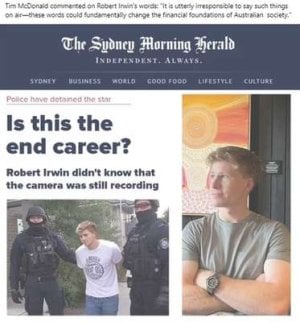'End of his career?': Aussie celebrity warns social media users over fake headline
By
Danielle F.
- Replies 18
The digital age has brought us many conveniences that make daily lives easy.
However, with it comes the darker side of technology: scams.
Another TV personality fell victim to a nasty 'fake news' scam—reminding us to stay vigilant and take information online with a grain of salt.
Conservationist and celebrity Robert Irwin became the target of hoax advertisements, which appeared to be mockups of major Australian newspaper front pages.
One hoax involved a fake Sydney Morning Herald front page, which included a photo of Mr Irwin being arrested and a headline reading, 'Is this the end of his career? Robert Irwin didn't know the camera was still recording.'
The fake news article linked back to another bogus story claiming that a bank sued Mr Irwin due to comments he made on live TV.
The article described a completely made-up incident during an episode of The Cheap Seats, in which a fake Mr Irwin revealed a trading platform called Trade iPlex 100.
According to the fake ad, the platform could make people rich through an artificial intelligence-driven cryptocurrency trading strategy.
The scammers even asked readers to give the fake Mr Irwin $375 to help them make money using cryptocurrency.
The incident, the platform, and the claims were entirely made by scammers trying to take people's money.
Mr Irwin made it clear that he was not involved in the scam.
The National Anti-Scam Centre warned that scammers often use famous people's images, names, and likenesses to lure potential victims into cryptocurrency scams.
These can be very realistic, as scammers use artificial intelligence (AI) to create 'deep fakes' of the person, making the images and voices hard to recognize as fake.
Scammers use these celebrities' images in social media ads and fake news stories that appear to be from well-known news outlets.
A similar incident happened with TV presenter and business journalist David' Kochie' Koch.
Two women lost thousands after investing in a bogus platform promoted by a deep fake depiction of Mr Koch.
The National Anti-Scam Centre also reported progress towards combating scams.
The centre reported an 11 per cent fall in total scam losses over the year's first quarter.
Most of this improvement was led by shrinking losses to investment scams.
However, with $73.2 million still lost to fraudsters over three months, the battle is far from over.
Scammers exploited the current cost-of-living crisis by targeting people looking for ways to earn extra money.
They pose as legitimate businesses, offering good pay and flexibility, only to ask for small upfront payments with the false promise of reimbursement.
According to the report, younger Australians from culturally and linguistically diverse backgrounds are at risk of falling for these scams.
Social media scams, in particular, continue to trend upward, although losses to scams circulating on these platforms have decreased.
Financial Services Minister Stephen Jones has indicated that the government's scam crackdown, including the creation of the National Anti-Scam Centre last year, is making a difference.
The federal government is also consulting on mandatory industry codes that require digital platforms, banks, and telcos to prevent scam risks or face penalties.
If you've encountered a scam or suspect you may be a target, don't hesitate to report it.
The SDC Forum's Scam Watch has updates on the latest schemes and how to prevent them.

Have you or someone you know encountered this fake headline? Share your experiences and safety tips in the comments below.
However, with it comes the darker side of technology: scams.
Another TV personality fell victim to a nasty 'fake news' scam—reminding us to stay vigilant and take information online with a grain of salt.
Conservationist and celebrity Robert Irwin became the target of hoax advertisements, which appeared to be mockups of major Australian newspaper front pages.
One hoax involved a fake Sydney Morning Herald front page, which included a photo of Mr Irwin being arrested and a headline reading, 'Is this the end of his career? Robert Irwin didn't know the camera was still recording.'
The fake news article linked back to another bogus story claiming that a bank sued Mr Irwin due to comments he made on live TV.
The article described a completely made-up incident during an episode of The Cheap Seats, in which a fake Mr Irwin revealed a trading platform called Trade iPlex 100.
According to the fake ad, the platform could make people rich through an artificial intelligence-driven cryptocurrency trading strategy.
The scammers even asked readers to give the fake Mr Irwin $375 to help them make money using cryptocurrency.
The incident, the platform, and the claims were entirely made by scammers trying to take people's money.
Mr Irwin made it clear that he was not involved in the scam.
The National Anti-Scam Centre warned that scammers often use famous people's images, names, and likenesses to lure potential victims into cryptocurrency scams.
These can be very realistic, as scammers use artificial intelligence (AI) to create 'deep fakes' of the person, making the images and voices hard to recognize as fake.
Scammers use these celebrities' images in social media ads and fake news stories that appear to be from well-known news outlets.
A similar incident happened with TV presenter and business journalist David' Kochie' Koch.
Two women lost thousands after investing in a bogus platform promoted by a deep fake depiction of Mr Koch.
The National Anti-Scam Centre also reported progress towards combating scams.
The centre reported an 11 per cent fall in total scam losses over the year's first quarter.
Most of this improvement was led by shrinking losses to investment scams.
However, with $73.2 million still lost to fraudsters over three months, the battle is far from over.
Scammers exploited the current cost-of-living crisis by targeting people looking for ways to earn extra money.
They pose as legitimate businesses, offering good pay and flexibility, only to ask for small upfront payments with the false promise of reimbursement.
According to the report, younger Australians from culturally and linguistically diverse backgrounds are at risk of falling for these scams.
Social media scams, in particular, continue to trend upward, although losses to scams circulating on these platforms have decreased.
Financial Services Minister Stephen Jones has indicated that the government's scam crackdown, including the creation of the National Anti-Scam Centre last year, is making a difference.
The federal government is also consulting on mandatory industry codes that require digital platforms, banks, and telcos to prevent scam risks or face penalties.
If you've encountered a scam or suspect you may be a target, don't hesitate to report it.
The SDC Forum's Scam Watch has updates on the latest schemes and how to prevent them.
Key Takeaways
- TV personality Robert Irwin has been targeted by a fake news scam exploiting his image and name.
- Artificial intelligence was used to create 'deep fakes' of Mr Irwin for scam advertisements on social media.
- Scammers exploited the ongoing cost-of-living crisis, misleading people into fraudulent jobs and investments promising extra money.
- Despite a recent reduction in scam losses, the Australian government's National Anti-Scam Centre continued working on mandatory industry codes to fight against such scams.









